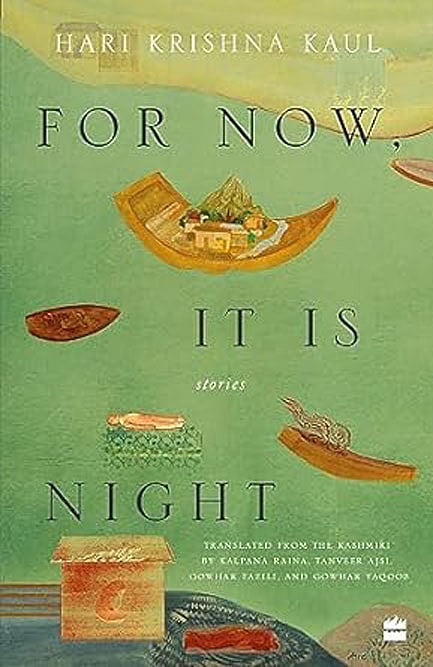Lost and Found in Kashmir

Hari Krishna Kaul (1934-2009) was a Kashmiri writer whose work is being presented in English for the first time in For Now, It Is Night, which contains a selection of his short stories published between 1972 and 2001. It has been translated by Kalpana Raina, Tanveer Ajsi, Gowhar Fazili and Gowhar Yaqoob through a deeply collaborative process, supported by the Yali Project at Sangam House, involving sourcing poorly preserved books in the original Nastaliq script, preparing voice recordings and then creating multiple individual drafts. The result is an unusual collection by a thoughtful, sardonic storyteller—one that willfully resists political and other binaries, while also being incisive.
Kaul left Kashmir during the 1990 exodus of the Pandits, and did not avoid societal tensions in the Valley in his work both before and after this pivotal event. He did this in a unique way, creating protagonists like Poshkuj in the opening story ‘Sunshine’, whose distrust of the Other, be that an institutional unknown or a known person unlike herself, clearly comes from a sense of insecurity that may have been compounded by external factors but is ultimately from within. We aren’t necessarily meant to like his characters, but Kaul renders them multi-dimensionally. As Raina, his niece and one of the translators, writes in the appendix: “[He] mocked and conveyed empathy for his characters and their situations… This was the world he had grown up in, and his ambivalent relationship with it is clear…”
AIming High
20 Feb 2026 - Vol 04 | Issue 59
India joins the Artificial Intelligence revolution with gusto
Ambivalence is present in the depiction of numerous characters, and not always because of religious prejudice—Kaul’s work doesn’t give in easily to expected biases, even of the author. In ‘The Saint and the Witch’, a much-praised deceased man is revealed to have been less than perfect to one particular person. ‘Dogs’ is an amusing and uncomfortable display of human pettiness and envy, as easily transposed to any location on earth. Kaul’s translators have curated a collection of depth and subtlety that will not satisfy a reader who demands unequivocal political or moral stances. It is this quality that makes the stories appealing, especially in reflection.
Occasionally through the collection, a stronger polemic—yet still a non-partisan—flavour is imparted. While depictions of individual bigotries are peppered throughout the collection, stories such as ‘That Which We Cannot Speak Of’ (published in 1985, about the 1931 uprising against Dogra rule) portray the uneasiness between communities as a response to tides shifting on a larger scale. In ‘One Sahib and the Other”, two powerful men enjoy each other’s company as those who fight for the ideologies they each represent give up their lives. In the satirical ‘The Tongue and the Egg’, the suffering of the masses for the privilege of the few is skillfully told through a surreal narrative with the logic of a dream—which perhaps is also the logic of many a grandiose agenda. The introduction of Kaul’s work into English adds nuance, even complicates, the media narrative of Kashmiri Pandits.
The collection ends memorably on the allegorical ‘To Rage or to Endure’, in which the folkloric figure of Sheně-Buddě is welcomed by an elderly woman with garlands of dried gourd and aubergine. The 14th-century Kashmiri mystic poet Lal Ded alluded to earlier in ‘That Which We Cannot Speak Of’ returns here. In the earlier story, the poet was invoked through a legend about her life, in which she could make lotus stalks sprout from skeins of thread, just as “present-day writers and poets spin lofty tales or weave ideas as fragile as the fibres of the lotus stalk”. Here, Kaul cleverly links Lal Ded’s wool skeins to the sacred thread of the Brahmins. The story is deceptively persuasive, drawing the reader in with nostalgia about grandmothers and winters, finally asserting a line that shares what may be Kaul’s personal understanding of the exile’s choice, or perhaps only the protagonist’s: “I have nothing to gain from rage. I must endure and adapt.”

